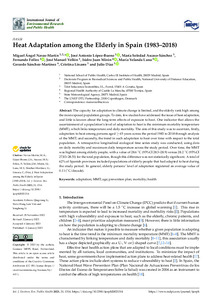Por favor, use este identificador para citar o enlazar este ítem:
http://hdl.handle.net/20.500.11765/14308
Heat adaptation among the elderly in Spain (1983–2018)
Registro completo de metadatos
| Campo DC | Valor | Lengua/Idioma |
|---|---|---|
| dc.contributor.author | Navas-Martín, Miguel Ángel | es_ES |
| dc.contributor.author | López Bueno, José Antonio | es_ES |
| dc.contributor.author | Ascaso Sánchez, María Soledad | es_ES |
| dc.contributor.author | Follos Pliego, Fernando | es_ES |
| dc.contributor.author | Vellón Graña, José Manuel | es_ES |
| dc.contributor.author | Mirón Pérez, Isidro Juan | es_ES |
| dc.contributor.author | Luna Rico, Yolanda | es_ES |
| dc.contributor.author | Sánchez Martínez, Gerardo | es_ES |
| dc.contributor.author | Linares Gil, Cristina | es_ES |
| dc.contributor.author | Díaz, Julio | es_ES |
| dc.date.accessioned | 2023-01-17T12:35:45Z | - |
| dc.date.available | 2023-01-17T12:35:45Z | - |
| dc.date.issued | 2023 | - |
| dc.identifier.citation | International Journal of Environmental Research and Public Health. 2023, 20(2), 1314 | es_ES |
| dc.identifier.issn | 1660-4601 | - |
| dc.identifier.issn | 1661-7827 | - |
| dc.identifier.uri | http://hdl.handle.net/20.500.11765/14308 | - |
| dc.description.abstract | The capacity for adaptation to climate change is limited, and the elderly rank high among the most exposed population groups. To date, few studies have addressed the issue of heat adaptation, and little is known about the long-term effects of exposure to heat. One indicator that allows the ascertainment of a population’s level of adaptation to heat is the minimum mortality temperature (MMT), which links temperature and daily mortality. The aim of this study was to ascertain, firstly, adaptation to heat among persons aged ≥ 65 years across the period 1983 to 2018 through analysis of the MMT; and secondly, the trend in such adaptation to heat over time with respect to the total population. A retrospective longitudinal ecological time series study was conducted, using data on daily mortality and maximum daily temperature across the study period. Over time, the MMT was highest among elderly people, with a value of 28.6 ◦C (95%CI 28.3–28.9) versus 28.2 ◦C (95%CI 27.83–28.51) for the total population, though this difference was not statistically significant. A total of 62% of Spanish provinces included populations of elderly people that had adapted to heat during the study period. In general, elderly persons’ level of adaptation registered an average value of 0.11 (◦C/decade). | es_ES |
| dc.language.iso | eng | es_ES |
| dc.publisher | MDPI | es_ES |
| dc.rights | Licencia CC: Reconocimiento CC BY | es_ES |
| dc.subject | Adaptation | es_ES |
| dc.subject | MMT | es_ES |
| dc.subject | Age | es_ES |
| dc.subject | Mortality | es_ES |
| dc.subject | Prevention plan | es_ES |
| dc.subject | Health | es_ES |
| dc.title | Heat adaptation among the elderly in Spain (1983–2018) | es_ES |
| dc.type | info:eu-repo/semantics/article | es_ES |
| dc.relation.publisherversion | https://doi.org/10.3390/ijerph20021314 | es_ES |
| dc.rights.accessRights | info:eu-repo/semantics/openAccess | es_ES |
| Colecciones: | Artículos científicos 2023-2026 | |
Ficheros en este ítem:
| Fichero | Descripción | Tamaño | Formato | ||
|---|---|---|---|---|---|
| ijerph-20-01314-v2.pdf | 3,05 MB | Adobe PDF |  Visualizar/Abrir |
Los ítems de Arcimis están protegidos por una Licencia Creative Commons, salvo que se indique lo contrario.





